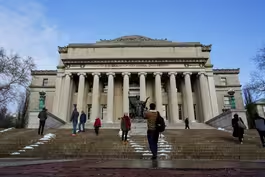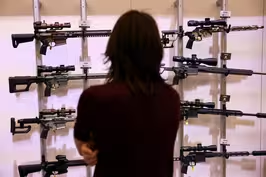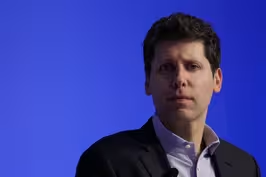
Fighting continues in Gaza ahead of hostage release
Clip: 11/22/2023 | 11m 53sVideo has Closed Captions
Fighting between Israel and Hamas continues in Gaza ahead of pause for release of hostages
After more than six weeks of heavy fighting, a pause in the battle between Israel and Hamas in Gaza is expected to start soon. That's after the Israeli government approved a deal that includes the release of at least 50 hostages held by Hamas. Nick Schifrin reports and Geoff Bennett discusses the Biden administration's role in negotiations with National Security Council spokesman John Kirby.
Problems playing video? | Closed Captioning Feedback
Problems playing video? | Closed Captioning Feedback
Major corporate funding for the PBS News Hour is provided by BDO, BNSF, Consumer Cellular, American Cruise Lines, and Raymond James. Funding for the PBS NewsHour Weekend is provided by...

Fighting continues in Gaza ahead of hostage release
Clip: 11/22/2023 | 11m 53sVideo has Closed Captions
After more than six weeks of heavy fighting, a pause in the battle between Israel and Hamas in Gaza is expected to start soon. That's after the Israeli government approved a deal that includes the release of at least 50 hostages held by Hamas. Nick Schifrin reports and Geoff Bennett discusses the Biden administration's role in negotiations with National Security Council spokesman John Kirby.
Problems playing video? | Closed Captioning Feedback
How to Watch PBS News Hour
PBS News Hour is available to stream on pbs.org and the free PBS App, available on iPhone, Apple TV, Android TV, Android smartphones, Amazon Fire TV, Amazon Fire Tablet, Roku, Samsung Smart TV, and Vizio.
Providing Support for PBS.org
Learn Moreabout PBS online sponsorshipGEOFF BENNETT: Welcome to the "NewsHour."
After more than six weeks of heavy fighting, a pause in the battle between Israel and Hamas in Gaza will have to wait at least one more day.
Israeli officials tell "PBS NewsHour" there will be no hostages released or pause in its military campaign until at least Friday.
The deal would lead to the release of at least 50 women and children held hostage by Hamas and 150 Palestinians detained by Israel.
Nick Schifrin has the latest.
NICK SCHIFRIN: In the hours leading up to temporary peace, there's intensified war.
Israeli jets bombed several targets across Gaza today, including Khan Yunis in the south, where many from Northern Gaza had fled for safety.
When the bombing began, some were praying in a mosque, including Abu Ahmed Al-Agha.
ABU AHMED AL-AGHA, Gaza (through translator): This is an entirely residential area.
They bombed it completely.
The ones who were in these homes were children, women and young people and those that came here to find safety.
NICK SCHIFRIN: In Northern Gaza, Israeli soldiers fought in alleyways and inside buildings.
This is fighting on Hamas' home turf inside the residential neighborhoods they use as bases.
The army released video of what it called an operation on a Hamas outpost in a school filled with rocket launchers, tunnel shafts and hundreds of rockets.
MAN: Now we are in the tunnel just below the... NICK SCHIFRIN: And the IDF escorted journalists through what Israel calls extensive tunnels underneath Gaza's Shifa Hospital that Hamas used to move and fight.
All of this fighting will pause no earlier than Friday for carefully choreographed hostage and prisoner releases.
Hamas promises to release a dozen women and children every day for four to five days for a total of 50.
And for each additional 10 women and children that Hamas releases, Israel would hold fire for an additional day.
Israel promises to release about 35 Palestinians currently in detention every day for 150 total.
A senior administration official said this round was supposed to include all 90 kidnapped children and women, but Hamas could only deliver 50, in part because it's not holding all of them, National Security Adviser Jake Sullivan told CBS Mornings today.
JAKE SULLIVAN, U.S. National Security Adviser: We do assess that other militant groups, even potentially criminal organizations, are holding some of the hostages and that Hamas is working to try to ensure that it can deliver on its side of the bargain.
NICK SCHIFRIN: In Israel, there remains a tension, the desire to see through the military operation and its goal of Hamas' complete destruction and fulfilling the Jewish saying, saving one life is like saving an entire world.
RUEBENA GREENBLAT, Israel: Whatever deal they will come to, whatever number of people will come back, we are agreeing to everything.
Just, we need all the people back, children, mothers, elder, soldiers, everybody, everybody.
NICK SCHIFRIN: But some politicians opposed holding fire at all, and some Israelis who've lost family in previous terrorist attacks consider released Palestinian prisoners a threat.
MEIR SCHIJVESCHUURDER, Lost Family Members in Bus Bombing (through translator): What comes up in today's apparent deal is that about 200 terrorists will be released back to Jerusalem.
This means that they will roam the streets and intensify the terror to levels that I don't know we can tolerate.
NICK SCHIFRIN: Today, the Israeli war cabinet defended the deal.
BENJAMIN NETANYAHU, Israeli Prime Minister (through translator): I want to be clear.
The war is continuing.
We will continue until we achieve all our goals.
NICK SCHIFRIN: In the occupied West Bank, the Abu Maria family is hoping their teenage son, Ube (ph), is on the list of released Palestinian prisoners.
FIDA ABU MARIA, Mother of Prisoner (through translator): I wish all the prisoners would be released, like those sentenced for high crimes and women and children.
NICK SCHIFRIN: The deal will also allow 300 humanitarian aid trucks to enter Gaza each day, more than three times the current limit.
Inside Gaza, for the displaced packed into overwhelmed shelters, that assistance and a pause in the fighting cannot come soon enough.
SAMEEH AL KAFARNA, Displaced From Beit Hanoun (through translator): We want many humanitarian cease-fires.
We want a full cease-fire.
NICK SCHIFRIN: For both sides, this was a day of aspiration, after 47 days of brutal war, 47 days of waiting.
For the "PBS NewsHour," I'm Nick Schifrin.
GEOFF BENNETT: The Biden White House played a key role in negotiating the hostage deal.
I spoke with National Security Council spokesman John Kirby a short time ago.
Admiral John Kirby, welcome back to the "NewsHour."
JOHN KIRBY, NSC Coordinator For Strategic Communications: Thank you so much for having me.
GEOFF BENNETT: What more can you tell us about who will be included in this hostage release?
And how many Americans are expected to be in this group?
JOHN KIRBY: We don't know exactly who's going to be in this first increment that will come out.
And it's important for people to remember that not all 50 will come out together.
They will come back in smaller groups over the next few days.
We know that there are three Americans that we expect to be in this installment of 50, the whole group of 50.
We just don't know when they will be coming out.
And we certainly hope that they will be in at least one increment.
There are two American women and then there's young 4-year-old Abigail Mor Idan, who actually - - actually, she turns 4 on Friday, as a matter of fact.
That's her birthday.
So we have every expectation that, because they certainly qualify, this group of hostages are women and children, that those two American women and young Abigail will be among them.
That's our hope.
GEOFF BENNETT: There are nine American citizens and one green card holder whom are said to be missing.
What more does the U.S. know about their status?
JOHN KIRBY: We don't know a whole heck of a lot.
There are 10 total that we are tracking U.S. citizens.
And we don't know for sure how many are all in that hostage pool, but we believe there are more Americans that are being held hostage, somewhere up to about 10 total.
And, again, we just don't know exactly where they are.
We don't have information about what condition they're in.
We're doing the best we can to get as much information as possible.
But, again, the focus on this first negotiation will be on women and children.
GEOFF BENNETT: Well, as you mentioned, the hostages are expected to be released over a period of four days.
Take us through the choreography, the logistics of how that will play out.
JOHN KIRBY: So, sometime over the next 24 hours or so, hopefully sooner than that, we will start to see the first hostages move.
And that will be commensurate with a humanitarian pause, a pause in the fighting by both sides, to allow for the safe passage of those hostages.
And when that safe passage -- it'll be announced by Qatar.
When that safe passage -- or -- I'm sorry - - when that humanitarian pause starts, then we can expect the hostages will start to move and we will be able to start moving more trucks of aid in over the course of those four days.
We're looking at hopefully several hundred trucks of food, water, medicine and fuel to be included in the humanitarian assistance over those four days.
GEOFF BENNETT: Israel has said that, for every 10 additional hostages that are released, Israel would pause the fighting for another 24 hours.
Could this pause then be extended indefinitely?
Is that something that the U.S. wants?
JOHN KIRBY: Well, the pause could be extended in accordance with those parameters that Israel laid out.
I don't know that we could say indefinitely, but, certainly, if Hamas is willing to release more hostages, it certainly would appear that Israel would be willing to keep the pause in place.
That would be a good thing if we could get even more hostages out than these 50-plus women and children.
We want to get all those hostages released to their families, where they belong.
They shouldn't have been held hostages in the first place.
But we have to see.
I got to tell you, right now, the focus is on implementing the deal before us, which is for the four days, the 50-plus women and children, and getting that additional humanitarian assistance in.
GEOFF BENNETT: Well, let's talk more about that.
What is the plan to surge badly needed humanitarian aid into Gaza and into the hands of innocent civilians, the folks who need it the most?
JOHN KIRBY: We're working with the U.N., we're working with relief agencies, we're working with the government of Egypt and, of course, Israel to stack up as many trucks loaded as heavily as they can be with food, water, medicine, and now again fuel, which the Israelis have committed to, allowing to go in tens of thousands of gallons per day over the course of this pause.
And we're getting them racked and stacked so that, if in fact we can get this pause in place -- and we're all obviously waiting with bated breath to see if it will get implemented - - those trucks can be ready to roll through that Rafah Crossing.
Before the war started, about 500 trucks a day were going into Gaza, not all through Rafah, but about 500 trucks.
And now it's a combat zone, so it's a little bit more difficult to get that level up there.
But we have thus far been able to get roughly about 100 a day.
We fell short a few days.
We have exceeded it a few days.
We think that this deal, if it's implemented by all sides, we could get several hundred trucks in over the course of the next few days.
GEOFF BENNETT: Are there concerns that Hamas will use this pause in fighting Gaza to regroup and to reorient for the potential fight to come?
JOHN KIRBY: That's always a concern.
When you're dealing with a terrorist group like this, any pause in the fighting could allow them to regroup, refit, retrain, resource their troops.
That's always going to be a concern.
I know the Israelis are concerned about that.
They will certainly be watching for that.
And that's why this negotiation doesn't come without risk to the Israeli Defense Forces.
There was certainly an aspect here of some moral courage by the war cabinet and President - - I'm sorry -- Prime Minister Netanyahu to allow for this pause, because that could be a concern there, that Hamas might use that time.
That's one of the reasons why, quite frankly, we're not in favor of a permanent cease-fire, because that does benefit Hamas to a fare-thee-well, to allow them additional time and breathing space to prepare and plan for other attacks.
GEOFF BENNETT: Admiral, does this deal, once it's implemented, does it provide a framework for future agreements, potentially?
JOHN KIRBY: It could.
It certainly could.
Again, we're focused on the deal in front of us, the one that we worked so hard.
The president was personally engaged in helping broker this deal.
We want to see it implemented.
And now we're at that moment.
So our focus is on the next few days and making sure that all sides meet their commitments.
But could it open up other opportunities?
We certainly hope so, in terms of getting other hostages out and getting more humanitarian assistance in.
GEOFF BENNETT: Understanding that your focus is on the here and now, what's the plan for the day after, on day five, when this pause lifts?
JOHN KIRBY: Well, again, we will have to see where we are.
I wish I could answer that question.
It's difficult for us to put ourselves five days into the future right now.
We want to see more hostages come out.
And if, at the end of the four days, there's an opportunity and a willingness on both sides to extend the pause, to extend the agreement, to allow more hostages to get out, that would be a great thing.
And we certainly would be in favor of that.
But, again, I don't want to get ahead of where we are.
We really are in the very early stages here of implementation on this deal.
And it's really important to all of us and I know it's important to all the families out there, the families of these hostages, that this deal get implemented, and get implemented well.
GEOFF BENNETT: National Security Council spokesperson John Kirby, thanks for your time, Admiral.
We appreciate it.
JOHN KIRBY: You bet.
Good to be with you.
Columbia slammed for ignoring complaints about OB-GYN
Video has Closed Captions
Clip: 11/22/2023 | 8m 10s | Columbia Univ. faces scrutiny for ignoring complaints about OB-GYN who abused patients (8m 10s)
Inside the renovated National Museum of Women in the Arts
Video has Closed Captions
Clip: 11/22/2023 | 7m 10s | A look inside the National Museum of Women in the Arts after its major renovation (7m 10s)
More American families rely on food banks amid high prices
Video has Closed Captions
Clip: 11/22/2023 | 7m 1s | More American families rely on food banks as high prices squeeze budgets (7m 1s)
New report reveals graphic aftermath of mass shootings
Video has Closed Captions
Clip: 11/22/2023 | 8m 36s | Report showing graphic aftermath of mass shootings raises questions about avoiding images (8m 36s)
Why OpenAI brought Sam Altman back as CEO
Video has Closed Captions
Clip: 11/22/2023 | 4m 27s | Why OpenAI reversed course and brought Sam Altman back as CEO (4m 27s)
Providing Support for PBS.org
Learn Moreabout PBS online sponsorship
- News and Public Affairs

FRONTLINE is investigative journalism that questions, explains and changes our world.

- News and Public Affairs

Amanpour and Company features conversations with leaders and decision makers.












Support for PBS provided by:
Major corporate funding for the PBS News Hour is provided by BDO, BNSF, Consumer Cellular, American Cruise Lines, and Raymond James. Funding for the PBS NewsHour Weekend is provided by...




